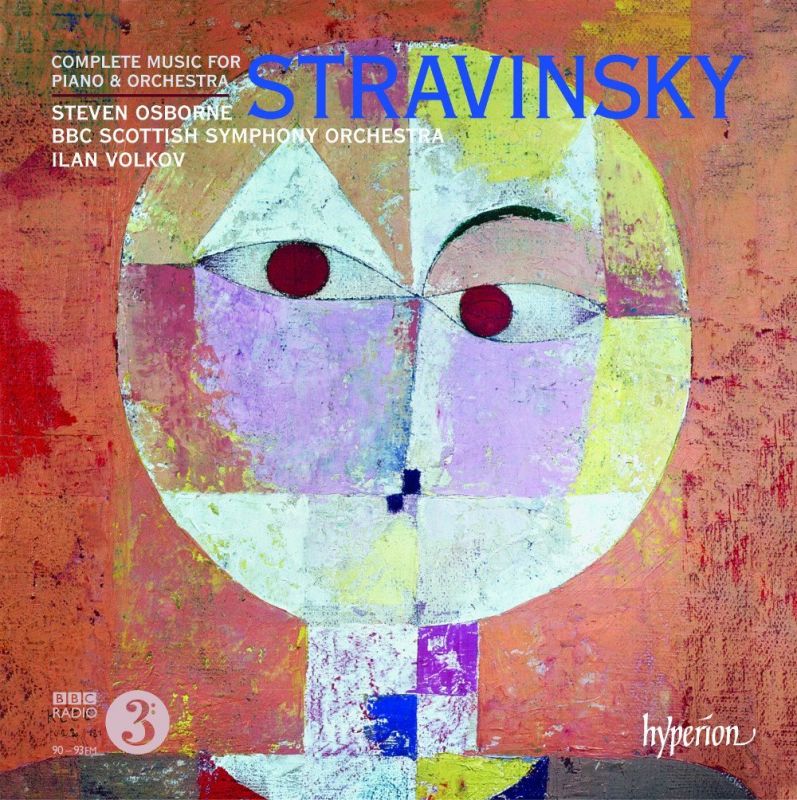STRAVINSKY Complete music for piano & orchestra
Osborne and Volkov tick a major Stravinsky box
View record and artist detailsRecord and Artist Details
Composer or Director: Igor Stravinsky
Genre:
Orchestral
Label: Hyperion
Magazine Review Date: 08/2013
Media Format: CD or Download
Media Runtime: 60
Mastering:
DDD
Catalogue Number: CDA67870

Tracks:
| Composition | Artist Credit |
|---|---|
| Song of the Volga Boatmen (Chant des bataliers) |
Igor Stravinsky, Composer
BBC Scottish Symphony Orchestra Igor Stravinsky, Composer Ilan Volkov, Conductor Steven Osborne, Piano |
| Concerto for Piano and Wind Instruments |
Igor Stravinsky, Composer
BBC Scottish Symphony Orchestra Igor Stravinsky, Composer Ilan Volkov, Conductor Steven Osborne, Piano |
| Capriccio |
Igor Stravinsky, Composer
BBC Scottish Symphony Orchestra Igor Stravinsky, Composer Ilan Volkov, Conductor Steven Osborne, Piano |
| Movements |
Igor Stravinsky, Composer
BBC Scottish Symphony Orchestra Igor Stravinsky, Composer Ilan Volkov, Conductor Steven Osborne, Piano |
| Concerto |
Igor Stravinsky, Composer
BBC Scottish Symphony Orchestra Igor Stravinsky, Composer Ilan Volkov, Conductor |
| Canon on a Russian Popular Tune |
Igor Stravinsky, Composer
BBC Scottish Symphony Orchestra Igor Stravinsky, Composer Ilan Volkov, Conductor Steven Osborne, Piano |
Author: John Warrack
Of the three works for piano and orchestra, the most severe is the Concerto for Piano and Wind, written in 1923 24 when Stravinsky was embarking upon his most neo-classical phase. It places huge demands on soloist, surely conductor, and also recording engineers, all of whom sail through unscathed by the technical problems and the difficult sonorities (full woodwind and brass, no strings apart from double basses). The Capriccio is, as its name implies, a work written to beguile, which it does, and would benefit from an altogether more light-hearted approach than the extremely efficient Steven Osborne gives it. His technique is up to all the demands placed upon him, including the very difficult Movements, written in 1958 59 as Stravinsky was entering Webern-like waters, and approaching Boulez in complexity. No one can possibly hear how the maths all works out but that does not matter: Stravinsky had a much better ear than most, certainly than the more rigorous serialists of the day (the 1950s). In fact, the five short movements can sound – how Stravinsky would have hated the word! – rather pretty.
Discover the world's largest classical music catalogue with Presto Music.

Gramophone Digital Club
- Digital Edition
- Digital Archive
- Reviews Database
- Full website access
From £8.75 / month
Subscribe
Gramophone Full Club
- Print Edition
- Digital Edition
- Digital Archive
- Reviews Database
- Full website access
From £11.00 / month
Subscribe
If you are a library, university or other organisation that would be interested in an institutional subscription to Gramophone please click here for further information.




